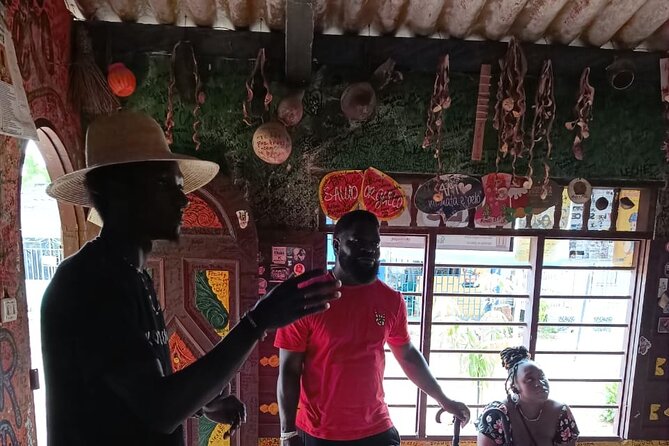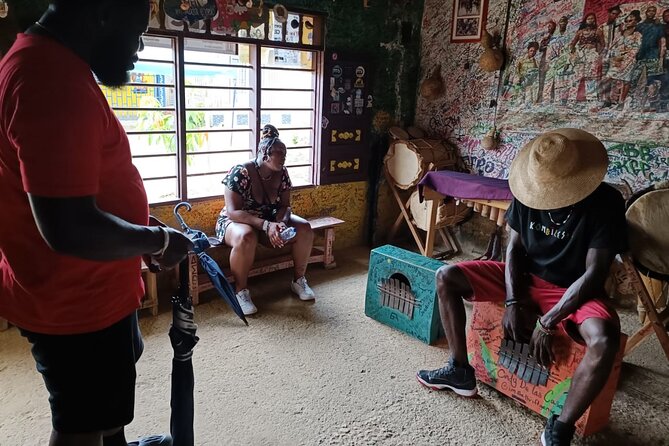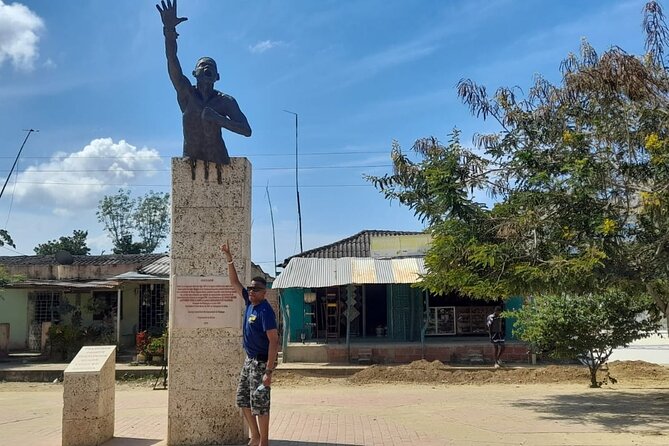Nestled in the lush landscapes of Colombia, Palenque stands as a testament to the resilience and cultural richness of the Afro-Colombian people. Established in the early 16th century as a refuge for escaped enslaved Africans, this vibrant community has maintained its autonomy and preserved its unique heritage through the centuries. From its distinctive architecture to its vibrant music, dance, and culinary traditions, Palenque offers a captivating glimpse into the enduring legacy of the African diaspora in the Americas. As we delve deeper into the history and cultural tapestry of this remarkable place, we’ll uncover the remarkable stories that have shaped its enduring identity.
About Your Stay

-
Palenque was established in the early 16th century as a haven for escaped enslaved Africans, symbolizing resistance against Spanish colonial rule.
-
The community has maintained autonomy for centuries, representing freedom and resilience, with a rich cultural heritage evident in architecture, music, and cuisine.
-
Palenque’s culinary traditions, including signature dishes like Sancocho and Arroz de coco, are vital for preserving the town’s Afro-Colombian cultural identity.
-
The vibrant Champeta music and traditional dances like Bullerengue showcase the community’s artistic expressions and pride in their Afro-Colombian roots.
-
Palenque faces socioeconomic challenges, but the resilient community has developed creative solutions, including eco-tourism and community-run initiatives, to preserve its cultural identity.
Historical Background of Palenque

Palenque is a town located in the Cartagena region of Colombia, known for its rich history and unique cultural heritage.
Established in the early 16th century, Palenque was a haven for escaped enslaved Africans who formed an autonomous community. This community, known as Palenque de San Basilio, resisted Spanish colonial rule for centuries, becoming a symbol of resistance and freedom.
The town’s history is deeply intertwined with the struggle against slavery and the preservation of Afro-Colombian identity.
Today, Palenque remains a vibrant cultural center, celebrating its heritage through music, dance, and traditional practices passed down through generations.
You can also read our reviews of more tours and experiences in Cartagena.
Palenque’s Unique African Heritage
The town’s unique African heritage is a defining aspect of Palenque’s identity. Established as a self-governing community of escaped slaves in the 17th century, Palenque has maintained strong cultural ties to its African roots.
The architecture, music, dance, and cuisine all reflect the influence of West African traditions. Residents take great pride in their Afro-Colombian heritage, which they celebrate through vibrant festivals and traditions.
The town’s history as a maroon settlement has imbued Palenque with a spirit of resilience and self-determination. Today, visitors can enjoy this rich cultural tapestry, gaining a deeper appreciation for the town’s enduring African legacy.
Architecture and Archaeology of Palenque

Nestled within the lush rainforests of Colombia’s Montes de María region, Palenque’s architectural marvels and archaeological wonders offer a glimpse into the town’s rich history.
The remnants of ancient structures, including the iconic Plaza Mayor and towering adobe houses, provide tangible evidence of the town’s pre-Columbian roots.
Archaeologists have uncovered intricate stone carvings, pottery, and other artifacts that shed light on the sophisticated culture and societal structure of Palenque’s early inhabitants.
Today, these archaeological sites draw visitors from around the world, captivating them with the enduring legacy of this remarkable Afro-Colombian community.
Cuisine and Culinary Traditions
Alongside its architectural marvels and archaeological wonders, Palenque’s culinary traditions have also played a vital role in preserving the town’s rich cultural heritage.
Drawing from the diverse ingredients and techniques of the Afro-Caribbean region, the local cuisine features an array of vibrant and flavorful dishes.
Some of the signature items include:
- Sancocho, a hearty stew made with meat, plantains, and root vegetables
- Arroz de coco, a coconut-infused rice dish
- Arepa de huevo, a stuffed corn cake
- Pescado frito, freshly fried local fish
- Dulce de leche, a creamy caramel-like dessert
These culinary delights not only nourish the body but also connect the people of Palenque to their ancestral roots.
Music, Dance, and Performing Arts
Palenque’s vibrant cultural landscape is further enriched by its thriving music, dance, and performing arts traditions. The town is renowned for its lively Champeta music, a blend of African rhythms and Colombian styles.
Locals enthusiastically participate in traditional dances like the Bullerengue, characterized by energetic footwork and soulful vocals. Palenque also celebrates its heritage through colorful festivals featuring masked dancers, drumming, and theatrical performances.
These artistic expressions serve as a testament to the community’s resilience and pride in its Afro-Colombian roots. Visitors can enjoy these captivating cultural experiences, gaining a deeper appreciation for Palenque’s rich artistic tapestry.
Socioeconomic Challenges and Resilience
Palenque faces a range of socioeconomic challenges, yet the town’s resilient community has developed creative solutions to address these issues. Poverty, limited access to healthcare, and education gaps are just a few obstacles the residents confront.
However, the people of Palenque have demonstrated remarkable ingenuity. Key initiatives include:
- Establishing community-run medical clinics and traditional herbal practices
- Founding cooperative farming projects to increase food security
- Investing in vocational training programs to develop in-demand skills
- Promoting eco-tourism to generate sustainable income streams
- Advocating for government support and infrastructure improvements
Through this collective effort, Palenque’s vibrant culture and community spirit remain steadfast, serving as an inspiring model of resilience.
Preserving Palenque’s Cultural Identity
Preserving the cultural identity of Palenque remains a steadfast priority for its resilient community.
As one of the first free Black settlements in the Americas, Palenque has a rich heritage that’s deeply rooted in its history of resistance and self-determination. The town’s residents work tirelessly to maintain their traditional practices, language, and way of life in the face of modernization and outside influences.
Through initiatives like the preservation of ancestral homes, the promotion of Palenque’s unique Creole cuisine, and the passing down of oral traditions, the community ensures that its vibrant cultural identity endures for generations to come.
This unwavering commitment to safeguarding their heritage is a testament to the resilience and pride of the Palenquero people.
Experiencing Palenque’s Vibrant Community

Visiting Palenque, one is immediately struck by the vibrant community spirit that permeates the town.
Locals gather in Benko Bioho Square, exchanging stories and laughter. The town’s naturopathic doctor welcomes visitors, sharing his knowledge of traditional healing practices.
Colorful murals adorn the buildings, showcasing the town’s rich heritage. Residents take pride in their unique linguistic traditions, with the guide leading the tour in their native tongue.
The tour concludes with a stop at the iconic "Letters of Palenque," a testament to the community’s resilience and cultural identity.
- Lively town square
- Traditional healing practices
- Vibrant murals
- Linguistic traditions
- "Letters of Palenque"
Questions About Your Stay
What Is the Best Time of Year to Visit Palenque?
The best time to visit Palenque is during the dry season, from November to April. The weather’s milder, with less humidity and rainfall, making it an ideal time to explore the historic town comfortably.
Are There Any Safety Concerns for Tourists in Palenque?
Though Palenque is generally safe for travelers, visitors should exercise caution. Petty crime and pickpocketing can occur, so travelers should keep valuables secure and avoid walking alone at night. Guided tours mitigate safety concerns for most travelers.
Can Visitors Interact With the Local Residents During the Tour?
Visitors can interact with local residents during the tour, though the extent of interaction may be limited. The tour includes a stop at the town’s naturopathic doctor, where visitors can observe and potentially engage with the locals.
What Are the Transportation Options to Reach Palenque From Cartagena?
The tour includes roundtrip transportation in an air-conditioned bus from Cartagena to Palenque. Visitors don’t need to arrange their own transportation as it’s provided as part of the tour package.
Are There Any Guided Tours That Provide an In-Depth Exploration of Palenque?
Yes, the My Cartagena Tours offers a guided tour that provides an in-depth exploration of Palenque. The tour includes a visit to the town’s naturopathic doctor and a stop at the Letters of Palenque.
Final Verdict On This Stay
Palenque stands as a remarkable testament to the resilience and cultural pride of Afro-Colombian communities. Its vibrant traditions, from music and dance to cuisine, have endured despite socioeconomic challenges. Preserving this heritage remains a priority, as Palenque continues to inspire a sense of identity and connection to its African roots. Though facing obstacles, the people of Palenque remain committed to celebrating their unique history and community.
More Historical Tours in Cartagena
More Tour Reviews in Cartagena
Not for you? Here's more nearby things to do in Cartagena we have reviewed
- Tour of Cholón Island Rosario Islands
- Cartagena in Times of War
- Cartagena: Roman Forum Entry Ticket
- Cartagena : Roman Theatre Museum Entry Ticket
- Cartagena: Panoramic Lift & Conception Castle Ticket
- 25 Best Tours In Cartagena
- 21 Best Guided Tours In Cartagena
- 3 Best National Park Tours In Cartagena
- 12 Best Shore Excursions In Cartagena
- 16 Best Shopping Tours In Cartagena
- 25 Best Drinking Tours In Cartagena
- Ecoruta Volcano of Totumo and Experience in the Mangroves
